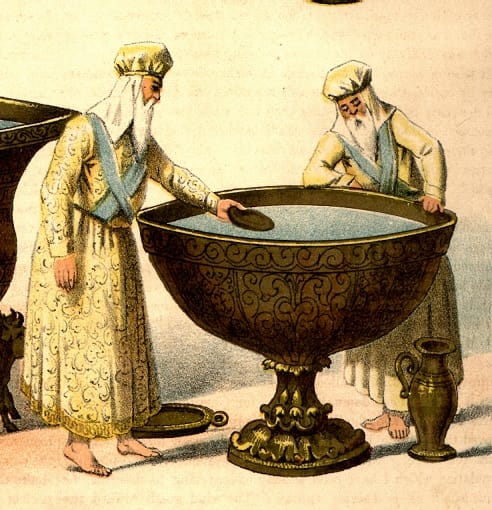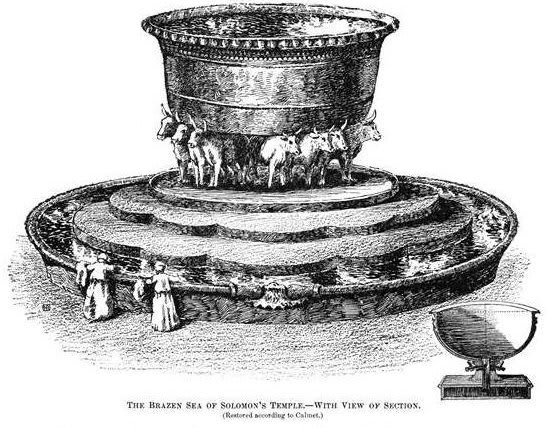This is one of my favorite Christmas songs, written and performed by my good friend, Jack Korbel. (I really need to ask Jack whether he considers this to be a Christmas song). If I were to try and describe its message in one phrase, I think it is about epiphany and the nobility of humankind.
Oh, the wondrous light of a guiding star
serves to remind us of what we are.
Be humble for you are made of earth.
Be noble for you are made of stars.
Earth and Stars Hymn by Jack Korbel

The Creation of Adam
I thought of this song the other night as I was reading Midrash Bereshit Rabbah on the creation of Adam.
Everything that you see is generated from heaven and earth, as it is said, “God created the heavens and the earth” (Genesis 1:1). On the second day He created from on high, as it is said, “And God said, ‘Let there be a firmament'” (Genesis 1:6). On the third day He created from below, “And God said, ‘Let the earth bring forth grass'” (Genesis 1:11). On the fourth day He created from on high, “And God said, ‘Let there be lights'” (Genesis 1:14). On the fifth day He created from below, “And God said, ‘Let the waters swarm'” (Genesis 1:20). On the sixth day He came to create Adam. He said, “If I create him from on high now, the heights will lord it over the lowly things by one creation, and there will be no peace in the cosmos. And if I create him from the lowly things now, the lowly things will lord it over the heights by one creation, and there will be no peace in the cosmos. But, behold! I will create him from both the heights and the lowly things for the sake of peace.” Thus it is written, “And the LORD God fashioned the man, etc.” (Genesis 2:7). [He was made from] the dust of the earth, from the lowly things. “And He breathed into his nostrils the breath of life” (Genesis 2:7). This is from the heights. As Rabbi Simeon Ben Laqish said, “‘Sovereignty and fear are with Him. He makes peace in His heights’ (Job 25:2). ‘Sovereignty’ is Gabriel. ‘Fear’ is Michael.”
My translation of Midrash Bereshit Rabbah 12:8
Rivalry Between Heaven and Earth
So, human beings actually, by their very composite nature, are mediators between the material creation and spiritual realities. Consequently, our existence establishes peace (the Hebrew uses the richer word, shalom) between heaven and earth. Of course, the midrash above conveys this as though heaven and earth were engaging in a not-so-friendly rivalry. Depending on how God created Adam, either faction would be able to claim him. (This reminds me of my school days, when we learned about Kansas state history, and how the pro-slave and abolitionist parties violently quarreled over this territory in the days following the Kansas-Nebraska Act, hoping to build their respective representation in the federal government). God intentionally created Adam in such a way that both sides would be able to claim him as belonging with them. Thus, he is a bridge between heaven and earth. And being a mediator is one of the important jobs of priests. This further illustrates what I recently said about Adam’s priesthood.
St. Thomas Aquinas on the Composite Nature of Human Beings
This is actually very similar to what St. Thomas Aquinas has to say about human nature. You can read a great example of this in Summa Theologiae I:76:5:
The Philosopher [Aristotle] says (De Anima ii, 1), that “the soul is the act of a physical organic body having life potentially.”
… Since the form is not for the matter, but rather the matter for the form, we must gather from the form the reason why the matter is such as it is; and not conversely. Now the intellectual soul, as we have seen above (1:55:2) in the order of nature, holds the lowest place among intellectual substances; inasmuch as it is not naturally gifted with the knowledge of truth, as the angels are; but has to gather knowledge from individual things by way of the senses, as Dionysius says (Div. Nom. vii). But nature never fails in necessary things: therefore the intellectual soul had to be endowed not only with the power of understanding, but also with the power of feeling. Now the action of the senses is not performed without a corporeal instrument. Therefore it behooved the intellectual soul to be united to a body fitted to be a convenient organ of sense.
Now all the other senses are based on the sense of touch. But the organ of touch requires to be a medium between contraries, such as hot and cold, wet and dry, and the like, of which the sense of touch has the perception; thus it is in potentiality with regard to contraries, and is able to perceive them. Therefore the more the organ of touch is reduced to an equable complexion, the more sensitive will be the touch. But the intellectual soul has the power of sense in all its completeness; because what belongs to the inferior nature pre-exists more perfectly in the superior, as Dionysius says (Div. Nom. v). Therefore the body to which the intellectual soul is united should be a mixed body, above others reduced to the most equable complexion. For this reason among animals, man has the best sense of touch. And among men, those who have the best sense of touch have the best intelligence. A sign of which is that we observe “those who are refined in body are well endowed in mind,” as stated in De Anima ii, 9.
“Stuck In the Middle With You”
You might have to read that a few times before you really understand what St. Aquinas has to say there. In fact, it will help to read this whole section, including the preceding and following questions. What is important for our purposes here is that Thomas contrasts human beings with angels in that we have a much less perfect intellect, and with other animals in that our spiritual soul “has the power of sense in all its completeness.” So, you and I hold a middle position in creation. Another way of saying this is like this: in the human person, God really has established shalom between corporal and spiritual realities. We have a material body. But we bear the “image and likeness” of God. This is because Our Creator breathed our soul into us directly. He made us to rule over nature as His vassal lords and ladies. “I have said that ye are gods” (Psalm 82:6).
What Happened to Our Nobility?
Of course, the biblical narrative quickly moves away from this ideal picture of shalom between heaven and earth. In the Fall, our parents revolted against their Creator. The consequence is that nature now revolts against us. That includes our own personal natures. We easily fall prey to our bodily desires. Every broken New Year’s resolution is a reminder that you and I all too often behave more like earthly, brutish beasts than spiritual intellects. What we really need is an epiphany of the nobility of humankind.
If that’s where the story ended, the lowly things really would be able to take home a win in their struggle against the heights. Our debased and debauched identities would never be able to lay claim to our shared heritage with the denizens of heaven. We would never realize our crucial role as mediators between heaven and earth. There would be no shalom between these rival factions.
Epiphany Restores the Nobility of Humankind
Enter Epiphany.
Christmas is the great festal season of the Mystery of the Incarnation. On the Twelfth Day of Christmas we celebrate the manifestation of this mystery. In the modern West, we focus on the story of the Magi, and the manifestation of this mystery to the Gentiles. In the East, the focus is more on the Baptism of Our Lord. (But note: in the modern Catholic Church we still celebrate the Feast of the Lord’s Baptism on the Sunday following Epiphany).
In any case, both of these Gospel events are all about helping us enter into the wonder of the Mystery of the Incarnation. The Eternal Word of God has entered into Time and Space and taken on our very humanity. The Creator Himself now has a created body, crafted from the same dust that we are. He whom the heavens cannot contain has come down among the lowly things. A new mediator, a new Adam, bridges heaven and earth once again. Shalom returns to the picture. The visit of the Magi and the Baptism of Our Lord both bring us face to face with the epiphany of the nobility of humankind as uniquely embodied in Jesus.
More Epiphany of the Nobility of Humankind to Come!
This tips the balance of human nature towards the heights to an astonishing degree. What St. Thomas Aquinas says about our status in relation to the angels is, strictly speaking, true of our created nature. But the supernature of the Incarnation has done something to all of this that is beyond our comprehension. St. Paul says that we will judge the angels! (1 Corinthians 6:3). St. John says that what we are going to be has not yet been revealed, but we will be like Jesus (1 John 3:2). Whatever we are going to be, this revelation will be an epiphany of the nobility of humankind.
The Epiphany of the Nobility of Humankind and the Transfiguration
Perhaps this is why the third stanza of Jack Korbel’s sweet song is about the Transfiguration, another manifestation of our Lord’s identity. It is in the Transfiguration that we really see what humanity ennobled by divinity looks like. Following the star to Bethlehem, entering into the waters of Baptism with Jesus, and climbing up the path of Mt. Tabor all result in encounters with Jesus that wind up telling us something about ourselves. We recognize our frailty and earthiness.
The only proper response to such an epiphany is to bend the knee in reverent worship. To really see Jesus is to be humbled in an excruciatingly delicious way. But it is also to see the nobility that God has conferred upon our race. In Jesus, we once again reign with God over the cosmos. We can finally experience what it is to fulfill our Creator’s purpose of building shalom between the things on high and the lowly things within our particular domain. At last we can recognize the epiphany of the nobility of humankind.







